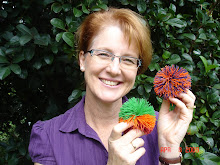Oh, This English!
We'll begin with a box and the plural is boxes,
But the plural of ox is oxen not oxes;
Then one fowl is a goose, but two are called geese,
Yet the plural of moose should never be meece!
You may find a lone mouse or a whole set of mice,
Yet the plural of house is houses not hice.
If the plural of man is always called men,
Why shouldn't the plural of pan be called pen?
If I speak of a foot and you show me your feet,
And I give you a boot, would a pair be called a beet?
If one is a tooth and a whole set are teeth,
Why wouldn't the plural of booth be beeth?
Then one may be that and three would be those,
Yet hat in the plural wouldn't be hose!
We speak of a brother and also of brethren,
But though we say mother we never say methren.
Then the masculine pronouns are he, his and him;
But imagine the feminine she shis and shim!
(Anom)
This little poem is just one of those great little resources I keep in my Upper Primary resource file. I love working with the Senior Primary students especially when we start "playing with words." I go to great lengths to try and get a laugh, as well as make opportunities for explicit instruction in regard to spelling rules or grammar usage. Vocabulary development and general knowledge are also a passion! This poem encourages the student to think further about the inconsistencies in our English language especially when it comes to natural patterns such as plurals. It can make for a great introduction to a lesson.
The other motivation to write this blog was a comment from a lovely teaching friend at my favourite school. She was complimenting me on some of the mnemonic ideas and stories I come up with to assist children with spelling concepts whether they be vowel digraphs, exceptions to the rules or simply tricky spelling. The truth is that she is the one with all the fanastic teaching ideas! However, last week the middle primary class I was teaching had a number of specific spelling words in their week's list that had the vowel a followed by s.
- ASK
- MASK
- TASK
- LAST
- FAST
- PAST
Traditionally, the word ASK falls into the tricky words category and is one of the words you encourage the students to remember by its configuration. Don't sound it out! However, here was the perfect opportunity to look for patterns. The students saw one too.....
The vowel A is being followed by S and is not making the expected vowel sound.......rather the vowel sound of AR. I quickly took the opportunity to make a visual representation...... I turned the S into a reverse snake and pretended it was biting the A on the foot. Poor A could only say "AR!" I had never thought to do this before! Over all the years of my teaching, I can't tell you how often I see children spelling ASK as ARSK. Now I have a visual aid to support the memory development. Check this web site to understand more about this fascinating area of memory development : they even have a mnemonic to remember how to spell mnemonic!

I would love to hear about any successes you may have had in this area too. I will continue to share bits and pieces like this under this heading of BAG OF TRICKS: OH,THIS ENGLISH and together we may get a useful collection of practical tried and true ideas.
Live, laugh and learn,
Blessing for the journey.....
Carmel

No comments:
Post a Comment